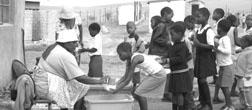
Jabu and Mpilo, the two social workers with Media in Education Trust (MiET) who introduced me to Nongoma, brought me to Ngxongwane Primary School to eavesdrop on their workshop. I also met with Musa, another MiET coordinator. Over the last two decades, HIV/AIDS have created a generation of orphans, leaving the community unprepared and under-resourced to care for the lost children. For three hours, the Jabu, Mpilo, and Musa educated community leaders, teachers, educators, and parents about the meaning and process of loss, grief, and mourning for orphans. Through group discussions and active participation, the partakers had an opportunity to build empathy for orphans and the skills necessary to appropriately accommodate to the unique needs of orphans. (Interestingly of the ~30 participants, only 2 were male.)
At one point, the workshop coordinators built an analogy between a person’s life and the growth and parts of a tree. The soil nurtures us, providing us our past and our history. From the soil, the large roots ground us, symbolizing our parents. The roots sprout the trunk, which represent the timeline of events in our life. Around the trunk bear the bark of our challenges, which build character, strength, and protection. The branches growing from the trunk build connections- a network of friends, family, co-workers, and the world. Leaves blossom from the branches, representing our wants, needs, fears, inhibitions, ambitions, and flaws. Some of these leaves fall and some replenish.
This is the tree of life. When an orphan loses his/her parents, the foundation of the tree is unstable. Only time and the replacements of roots, such other role models like teachers, community leaders, and other family members, can revitalize the stability of this tree.
At least this is my interpretation of the predominately Zulu-spoken workshop.










No comments:
Post a Comment